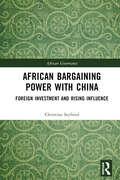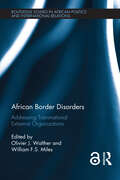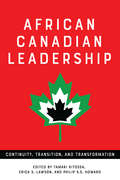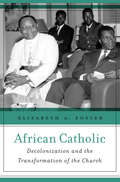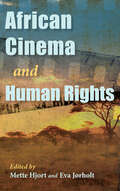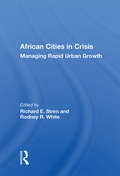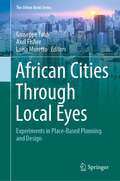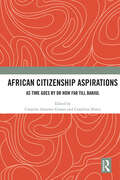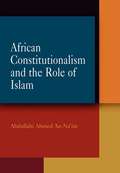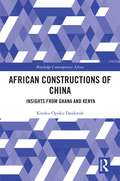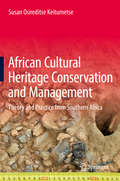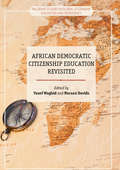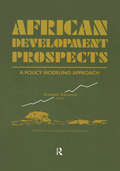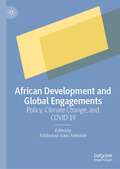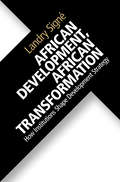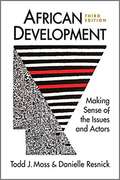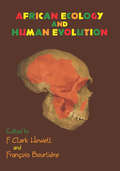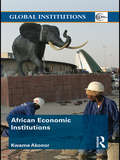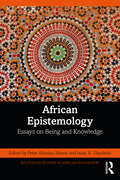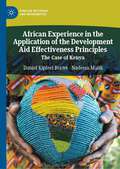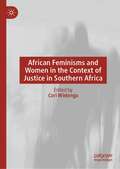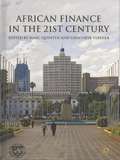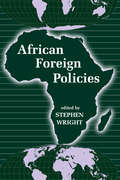- Table View
- List View
African Bargaining Power with China: Foreign Investment and Rising Influence (African Governance)
by Christina SeyfriedThis book provides a detailed account of the political economy around investment deal negotiations between African governments and private Chinese investors. The book draws on evidence from experiments and hundreds of interviews with policy makers and Chinese investors across Nigeria, South Africa, Kenya, Ethiopia and Tanzania. It shows that governments of authoritarian or one-party dominant states, which are among the top-receivers of Chinese investments, are able to easily and successfully act collectively to impose human capital and technology transfer requirements. The book argues that, rather than treating African countries as "price-takers" in the face of increasing Chinese influence in the continent, we should instead recognise the significant bargaining leverage that many African governments have to influence deal conditions, especially with smaller private Chinese companies. It demonstrates that several African governments can instead act "as price-setters" and that the success of the rising Chinese presence in Africa, and whether this leads to positive or negative development outcomes, fundamentally depends on the development strategies that individual African governments decide on. In the context of an often-polarised debate, the original research presented in this book has important implications for the future economic development strategies of African countries. As such, it will be of interest to researchers working on Chinese and African investment, politics, institutions, business, economics, and international relations.
African Border Disorders: Addressing Transnational Extremist Organizations (Routledge Studies in African Politics and International Relations)
by William F.S. Miles Olivier J. WaltherSince the end of the Cold War, the monopoly of legitimate organized force of many African states has been eroded by a mix of rebel groups, violent extremist organizations, and self-defence militias created in response to the rise in organized violence on the continent. African Border Disorders explores the complex relationships that bind states, transnational rebels and extremist organizations, and borders on the African continent. Combining cutting edge network science with geographical analysis, the first part of the book highlights how the fluid alliances and conflicts between rebels, violent extremist organizations and states shape in large measure regional patterns of violence in Africa. The second part of the book examines the spread of Islamist violence around Lake Chad through the lens of the violent Nigerian Islamist group Boko Haram, which has evolved from a nationally-oriented militia group, to an internationally networked organization. The third part of the book explores how violent extremist organizations conceptualize state boundaries and territory and, reciprocally, how do the civil society and the state respond to the rise of transnational organizations. The book will be essential reading for all students and specialists of African politics and security studies, particularly those specializing on fragile states, sovereignty, new wars, and borders as well as governments and international organizations involved in conflict prevention and early intervention in the region.
African Canadian Leadership: Continuity, Transition, and Transformation
by Tamari Kitossa Erica S. Lawson Philip S.S. HowardChallenging the myth of African Canadian leadership "in crisis," this book opens a broad vista of inquiry into the many and dynamic ways leadership practices occur in Black Canadian communities. Exploring topics including Black women’s contributions to African Canadian communities, the Black Lives Matter movement, Black LGBTQ, HIV/AIDS advocacy, motherhood and grieving, mentoring, and anti-racism, contributors appraise the complex history and contemporary reality of blackness and leadership in Canada. With Canada as a complex site of Black diasporas, contributors offer an account of multiple forms of leadership and suggest that through surveillance and disruption, practices of self-determined Black leadership are incompatible with, and threatening to, White "structures" of power in Canada. As a whole, African Canadian Leadership offers perspectives that are complex, non-aligned, and in critical conversation about class, gender, sexuality, and the politics of African Canadian communities.
African Catholic: Decolonization and the Transformation of the Church
by Elizabeth A. FosterElizabeth Foster examines how French imperialists and the Africans they ruled imagined the religious future of sub-Saharan Africa in the years just before and after decolonization. The story encompasses the transition to independence, Catholic contributions to black intellectual currents, and efforts to create an authentically “African” church.
African Cinema and Human Rights (Studies In The Cinema Of The Black Diaspora Ser.)
by Edited by Mette Hjort and Eva JørholtEssays and case studies exploring how filmmaking can play a role in promoting social and economic justice. Bringing theory and practice together, African Cinema and Human Rights argues that moving images have a significant role to play in advancing the causes of justice and fairness. The contributors to this volume identify three key ways in which film can achieve these goals: Documenting human rights abuses and thereby supporting the claims of victims and goals of truth and reconciliation within larger communitiesLegitimating, and consequently solidifying, an expanded scope for human rightsPromoting the realization of social and economic right Including the voices of African scholars, scholar-filmmakers, African directors Jean-Marie Teno and Gaston Kaboré, and researchers whose work focuses on transnational cinema, this volume explores overall perspectives, and differences of perspective, pertaining to Africa, human rights, and human rights filmmaking alongside specific case studies of individual films and areas of human rights violations. With its interdisciplinary scope, attention to practitioners&’ self-understandings, broad perspectives, and particular case studies, African Cinema and Human Rights is a foundational text that offers questions, reflections, and evidence that help us to consider film&’s ideal role within the context of our ever-continuing struggle towards a more just global society.
African Cities In Crisis: Managing Rapid Urban Growth
by Rodney R. White Richard E. StrenThis book presents the results of the "African Urban Management" project designed to study comparatively governmental responses to the gap between the realities of official plans and perspectives and the mushrooming world of the urban poor in African cities.
African Cities Through Local Eyes: Experiments in Place-Based Planning and Design (The Urban Book Series)
by Giuseppe Faldi Axel Fisher Luisa MorettoThis book provides readers with a wide overview of place-based planning and design experiments addressing such powerful transformations in the African built environment. This continent is currently undergoing fast paced urban, institutional and environmental changes, which have stimulated an increasing interest for alternative architectural solutions, urban designs and comprehensive planning experiments. The international and balanced array of the collected contributions explore emerging research concepts for understanding urban and peri-urban processes in Africa, discuss bottom-up planning and design practices, and present inspirational and innovative co-design methods and participatory tools for steering such change through public spaces, sustainable services and infrastructures. The book is intended for students, researchers, decision-makers and practitioners engaged in planning and design for the built environment in Africa and the Global South at large.
African Citizenship Aspirations: As Time Goes By or How Far Till Banjul
by Catarina Antunes Gomes Cesaltina AbreuThis collective work aims to critically reflect upon contemporary citizenship aspirations and practices in sub-Saharan Africa. Focusing on different realities, such as Angola, Mozambique and the Great Lakes region, it tries to unveil multiple historical commonalities, especially those arising from shared experiences of postcolonial violence and vulnerability. Thus, albeit the social realities under scrutiny cannot stand for the complexity of the Continent, the studies here gathered enlighten similar processes that can be identified in many other African contexts. That is certainly the case of the proliferation of religious manifestations and democratic demands that are currently being articulated in different countries such as Burundi, Central African Republic, Ethiopia, Sudan, Uganda and Nigeria.One such commonality can be referred to as a quest for being. Indeed, this quest for being has always underpinned African discourses and practices, either in postcolonial approaches, either in intellectual traditions, either in popular productions. These multiple practices reveal how, in certain circumstances, identity, as a product of historical wills of knowledge, power and truth, can be questioned as a site of possession and entrapment. How is one to be beyond colonial possession? Or beyond postcolonial authoritarian rule? Or beyond eurocentrism? African quests for being have always been quests for freedom. And they impose a debate on regimes of citizenship. Active citizenship is not merely a by-product of formal political systems; it is one that challenges them from the outside while actualizing the lessons of historical liberation struggles. As times goes by, the right to be still stands.The chapters of this book were originally published as a special issue in Citizenship Studies.
African Coalitions and Global Economic Governance
by Nelson Michael ByronThe proliferation of international institutions with overlapping scope and authority over issue areas creates strategic dilemmas for all states. While African states are often considered marginalised in world politics and global markets, Michael Byron Nelson shows how coalitions can form a crucial part of African strategies to influence international institutions and achieve results. Building a bottom-up analysis of global governance, through legal analysis, content analysis, and in-depth interviews, Nelson illuminates institutional and coalition dynamics through case studies of three key areas - food safety, intellectual property, and agricultural trade. He highlights the difficulties encountered by coalitions attempting to navigate institutional systems, emerging from institutional thickness (increasing the number of institutions involved) and integration (increasing the formal linkages between those institutions). Finally, Nelson shows how increasing the hierarchy of an institutional system, by creating a focal point on a single institution, can make coordination easier for coalitions.
African Constitutionalism and the Role of Islam
by Abdullahi Ahmed An-Na'imConstitutionalism is steadily becoming the prevalent form of governance in Africa. But how does constitutionalism deal with the lingering effects of colonialism? And how does constitutional law deal with Islamic principles in the region? African Constitutionalism and the Role of Islam seeks to answer these questions. Constitutional governance has not been, nor will be, easily achieved, Abdullahi Ahmed An-Na'im argues. But setbacks and difficulties are to be expected in the process of adaptation and indigenization of an essentially alien concept--that of of nation-state--and its role in large-scale political and social organization.An-Na'im discusses the problems of implementing constitutionalized forms of government specific to Africa, from definitional to conceptual and practical issues. The role of Islam in these endeavors is open to challenge and reformulation, and should not be taken for granted or assumed to be necessarily negative or positive, An-Na'im asserts, and he emphasizes the role of the agency of Muslims in the process of adapting constitutionalism to the values and practices of their own societies. By examining the incremental successes that some African nations have already achieved and An-Na'im reveals the contingent role that Islam has to play in this process. Ultimately, these issues will determine the long-term sustainability of constitutionalism in Africa.
African Constructions of China: Insights from Ghana and Kenya (Routledge Contemporary Africa)
by Kwaku Opoku DankwahMarking a constructivist turn in Africa-China scholarship, this book explores African constructions of China. Using Ghana and Kenya as case studies, the book outlines the role of diverse state and non-state actors in defining what China represents to the region, and how it compares to Western powers. Resisting Sino- and state-centric analysis of China-Africa relations, this book emphasises the importance of African agency in shaping the discourse. The book demonstrates that the identity construction of a foreign state such as China takes place both at the international level, and at a domestic, intrastate level. Domestic constructions of China in Ghana and Kenya reflect internal tensions about future directions for African political and socio-economic development, and these constructions in turn help to justify government policies towards China. The book concludes by questioning the idea of a straightforward win-win relationship, and suggests that exploitative, hierarchical relations conventionally associated with North-South interactions may continue in South-South relations. This book’s important analysis of the role of domestic non-state actors in shaping African policymaking extends much needed nuance to a sometimes polarised debate. It will be of interest to researchers across the fields of politics, international relations, global development, and African and Chinese Studies.
African Cultural Heritage Conservation and Management: Theory and Practice from Southern Africa
by Susan Osireditse KeitumetseFor a long time, resource conservationists have viewed environmental conservation as synonymous with wilderness and wildlife resources only, oblivious to the contributions made by cultural and heritage resources. However, cultural heritage resources in many parts of the developing world are gradually becoming key in social (e. g. communities' identities and museums), economic (heritage tourism and eco-tourism), educational (curriculum development), civic (intergenerational awareness), and international resources management (e. g. UNESCO). In universities, African cultural heritage resources are facing a challenge of being brought into various academic discourses and syllabi in a rather reactive and/or haphazard approach, resulting in failure to fully address and research these resources' conservation needs to ensure that their use in multiple platforms and by various stakeholders is sustainable. This book seeks to place African cultural heritage studies and conservation practices within an international and modern world discourse of conservation by presenting its varied themes and topics that are important for the development of the wider field of cultural heritage studies and management.
African Democratic Citizenship Education Revisited (Palgrave Studies in Global Citizenship Education and Democracy)
by Nuraan Davids Yusef WaghidThis edited collection explores how democratic citizenship education manifests across the African continent. A recognition of rights and responsibilities coupled with an emphasis on deliberative engagement among citizens, while not uniquely African, provides ample evidence that the concept can most appropriately be realised in relation to its connectedness with experiences of people living on the continent. Focussing on a diverse collection of voices, the editors and authors examine countries that have an overwhelming allegiance to democratic citizenship education. In doing so, they acknowledge that this concept, enveloped by a certain Africanness, has the potential to manifest in practices across the African continent. By highlighting the success of democratic citizenship education, the diverse and varied contributions from across this vast continent address the malaise in its implementation in countries where autocratic rule prevails. This pioneering volume will be an invaluable resource for researchers and students working in the fields of education and sociology, particularly those with an interest in education policy, philosophy of education and global citizenship initiatives.
African Development Prospects: A Policy Modelling Approach
by United Nations StaffFirst published in 1989. Routledge is an imprint of Taylor & Francis, an informa company.
African Development and Global Engagements: Policy, Climate Change, and COVID-19
by Adebusuyi Isaac AdeniranThe book takes a cursory look at the drivers and the directions of Africa’s developmental drive as a largely developing continent within the frameworks of the ever-dynamic global space, putting into perspective inherent challenges and opportunities of the 21st Century, and thereafter. Being the continent with most youthful population, Africa appears to still lack in requisite innovative interventions to transmute such demographic dividend into economic opportunities for the benefits of the larger population. Instead, there has been increasing trend in South-North migrations among both skilled and unskilled Africans across all age groups. Besides, impacts of climate change on the continent have also implied unstructured migratory trend within and beyond the bounds of the continent. Africa has continued to play a feeble role in various United Nations (UN)-enabled ‘Conference of Parties’ (COP) negotiations, such as the COP-26 in Glasgow, Scotland (2021). The management of recent Covid-19 epidemic across the world has presented a clear pointer to Africa that except development is internally-driven, no one is ready to exogenously drive sustainable good life for others. Ostensible ‘vaccine nationalism’ that has dotted the production and availability of various Covid-19 vaccine brands, which has ultimately left Africa as the ‘begging continent’ one more time calls for in-depth interrogation in contextualizing what the place of Africa has been, is and to be within the global interactive mode.
African Development, African Transformation: How Institutions Shape Development Strategy
by Landry SignéAfrica is home to many of the world's fastest-growing economies. This powerful book traces new continental institutions for development and their capacity to affect economic growth, regional integration, and international cooperation in Africa. It also assesses Africa's ability to achieve the Sustainable Development Goals and the African Union's Agenda 2063. As the continent's most ambitious development initiative since independence, the African Union Development Agency (or AUDA, previously known as the New Partnership for Africa's Development or NEPAD) provides an excellent case study for examining how an African-based, continent-wide development institution emerged. Inspired by the ideas of Pan-Africanism and the African Renaissance, NEPAD was created to bring Africa into the globalizing world, to close the gap between developing and developed countries, to enhance economic growth, and to eradicate poverty. Almost two decades after NEPAD's creation and it was given its transformation into AUDA, this brilliant book examines its role in achieving these goals.
African Development: Making Sense Of The Issues And Actors
by Danielle Resnick Todd J. MossBoth authoritative and accessible, African Development introduces the issues, actors, and institutions at play in development trajectories across sub-Saharan Africa. This new edition, thoroughly updated, includes an entirely new chapter devoted to key demographic trends in the region, especially rapid urbanization and the distinct “youth bulge.” There is also a review of major democratic gains and disappointments since 2011; analysis of renewed internal armed conflicts; and attention to the contemporary sovereign debt crisis relative to the structural adjustment debt of earlier decades. The book uniquely brings to life the collective impact of history, economics, and politics on development in the region.
African Ecology and Human Evolution
by F. Clark Howell Francois BourliereThe record of man's early evolution, though still fragmentary, is more complete on the African continent than anywhere else in the world. The ecological context of this evolution, however, has been studied intensively only in recent years. This pioneering volume draws together eminent specialists from many fields--physical anthropologists, zoologists, geologists, paleontologists, and prehistorians--who summarize here the results of their diverse research on Pleistocene environments and the cultural and biological evolution of man in Africa.This volume was sponsored by the Wenner-Gren Foundation for Anthropological Research Inc., which met at Burg Wartenstein, Austria. The editors have field experience in Africa, especially eastern and equatorial Africa. This experience is coupled with their awareness of the need to integrate results of numerous field studies bearing on the biological-behavioral evolution of higher primates with other field studies on the paleoecology and the mammalian ecology of sub-Saharan Africa.The book includes contributions on Pleistocene stratigraphy and climatic changes throughout the African continent; on the origin and evolution of the earliest man-like creatures in Africa; on the dating, distribution, and adaptation of Pleistocene hunter-gatherer peoples; and on the ecology, biology, and social behavior of African primate and human populations. The chapters reflect vividly the state of current knowledge at the time and indicate paths for future research. Over 100 maps and figures, detailed bibliographies, and a comprehensive index contribute to the importance of the volume for basic reference use.
African Economic Institutions (Global Institutions)
by Kwame AkonorThis book analyzes how, and under what conditions, African International Economic Organizations (IEO) have evolved, and what individual and collective contributions, if any, these African IEOs have had on Africa’s socio-economic development. Providing a comprehensive and accessible overview, the book covers the continent’s main IEOs, The United Nations Economic Commission on Africa, The African Development Bank; and The New Partnership for Africa’s Development as well as the five major Regional Economic Communities, including Economic Community of West African States, and Southern African Development Community. Assessing the degree to which African IEO’s have been able to chart their own course in coming up with their development agendas and priorities rather than following the lead of Global Institutions, this book: Provides a descriptive and analytical overview of the historical and contemporary development blueprints produced for Africa Clearly examines the contribution made by African economic institutions towards development Considers whether African economic institutions are building blocks or stumbling blocks in Africa’s development Offers a detailed evaluation and critique of African IEOs Enabling the reader to reach a deeper understanding of the challenges and potentials of development on the African continent, African Economic Institutions will be of interest to all students and scholars of African politics and development studies.
African Economies and the Politics of Permanent Crisis, 1979-1999
by Nicolas Van De WalleThis 2001 book explains why African countries have remained mired in a disastrous economic crisis since the late 1970s. It shows that dynamics internal to African state structures largely explain this failure to overcome economic difficulties rather than external pressures on these same structures as is often argued. Far from being prevented from undertaking reforms by societal interest and pressure groups, clientelism within the state elite, ideological factors and low state capacity have resulted in some limited reform, but much prevarication and manipulation of the reform process, by governments which do not really believe that reform will be effective, which often oppose reforms because they would undercut the patronage and rent-seeking practices which undergird political authority, and which lack the administrative and technical capacity to implement much reform. Over time, state decay has increased.
African Epistemology: Essays on Being and Knowledge (Routledge Studies in African Philosophy)
by Isaac E. Ukpokolo Peter Aloysius IkhaneThis book investigates how knowledge is conceived and explored within the African context. Epistemology, or the theory of knowledge, has historically been dominated by the Western approach to the discourse of knowledge. This book however shines a much-needed spotlight on knowledge systems originating within the African continent. Bringing together key voices from across the field of African philosophy, this book explores the nature of knowledge across the continent and how they are rooted in Africans’ ontological sense of being and self. At a time when moves to decolonize curricula are gaining momentum, this book shows how understanding the specific ways of knowing that form part of the every day life of the African, will play an important part in rebalancing studies of philosophy globally. Employing critical, conceptual and rigorous analyses of the nature and essence of knowledge as understood by indigenous African societies, the book ultimately asks what could pass as an African theory of knowledge. This important guide to the connections between knowledge and being, in African philosophical thought, will be an important resource for researchers and students of philosophy and African studies.
African Experience in the Application of the Development Aid Effectiveness Principles: The Case of Kenya (African Histories and Modernities)
by Nadeem Malik Daniel Kipleel BorterThis book analyses the diffusion and implementation of Aid Effectiveness Principles in Kenya’s agricultural sector. Although Aid Effectiveness Principles represent a significant step in aid and development discourse, studies on its implementation remain inadequate, especially in the African context. This book combines the perspectives of the Kenyan government, donor representatives and small-scale farmers. The discussion on Kenya brings in comparative perspectives and, therefore, would have broader relevance to the African region, in general. It highlights a disconnect between the government and farmers concerning the ownership concept, where farmers lack a voice in important policy matters. The book shows that donors have exploited the weaknesses in government responses to interpret The Principles in ways that suit their strategic interests. Consequently, the book argues that the diffusion of Aid Effectiveness Principles has taken the form of symbolic imitation – a form of policy diffusion where the policymakers choose policies for their symbolic value rather than their effectiveness.
African Feminisms and Women in the Context of Justice in Southern Africa
by Cori WielengaThis book explores justice ‘on the ground’ in Southern African communities, and in particular the roles that women play in these processes. Justice on the ground is often critiqued for being male-dominated and patriarchal. This volume seeks to unpack and problematize this assumption through the case studies of Namibia, Zimbabwe, Mozambique and South Africa. Contributions focus on the lived experiences of women and the intersections of race, class, culture and the colonial experience that shape their lives. In the rural and peri-urban contexts discussed in this book, justice on the ground is found to be relational. The network of relationships between people and the well-being and health of a community as an integral whole continue to be of central importance as the survival of the community depends on the entire community functioning interdependently. An engagement with African feminisms is helpful in providing a number of lenses, or simply questions, through which to read the case studies. These case studies reveal the complex and organic ways in which women have power and influence in relation to justice on the ground which may not be immediately obvious.
African Finance in the 21st Century
by Marc Quintyn Geneviève VerdierWith contributions by experts from official agencies in Africa, international financial institutions, the private sector, and academia, this book focuses on financial sector development in Sub-Saharan Africa and how institutions can play a more active role in economic development.
African Foreign Policies
by Stephen WrightThis volume of thirteen original essays provides a timely analysis of African foreign policies in a postCold War environment where African marginalization from the global economy appears to be increasing. Four thematic essays give an overview of critical changes occurring in African foreign policies, and ten country-by-country case studies provide specific analyses of decision-making, intraregional relations, and the struggles over policy with external agencies, including the World Bank and the International Monetary Fund. African Foreign Policies offers explanations for how African states are adapting to the international challenges of the late twentieth century. }Providing a timely analysis of the foreign policies of African states, this volume of original essays enables the reader to assess the position of African states within an evolving postCold War environment and to judge the extent of African marginalization from the global economy. As national foreign policies are increasingly influenced by factors such as regional organizations, democratization, external agencies like the World Bank and the International Monetary Fund, and the apparent weakening of state structures, there is need for fresh analysis of African foreign policies.The thirteen essays in this book, written by African, European, and North American scholars, provide comprehensive assessments of these issues in both analytical and prescriptive fashion. Three essays are thematic, considering broad areas of policy and change at the regional and continental levels; the other ten essays provide country-by-country case studies, drawing from a broad cross-section of countries in sub-Saharan Africa. Each essay analyzes factors such as decisionmaking, intraregional policies, and foreign policies toward non-African agents, including international financial institutions, and considers distinctions between formal and actual policies. As a whole, the volume seeks to explain how African countries foreign policies are adapting to new internal and international challenges in the fluid environment of the late twentieth century. }
